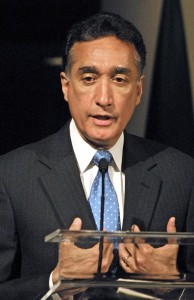‘PH ahead in civic involvement in housing,’ says US expert
I would say that the Philippines is ahead of many countries in the (Asean) region because it has such an understanding of the need for philanthropic giving, and large corporations doing their corporate social responsibilities.”
This was observed by former US Housing Secretary Henry Cisneros during an interview with Inquirer Property. Cisneros was one of the guest speakers of the Asia-Pacific Housing Forum held at the Dusit Thani Hotel in Makati from Oct. 2 to 4.
“Important work is done here in creating ways in which the wealthiest of Filipinos can contribute to this kind of social progress. Habitat for Humanity is one of those vehicles where families can give resources and know that they will be well spent and honestly accounted for,” he said.
According to Cisneros, he was “very impressed” with Fernando Zobel de Ayala, president and chief operating officer of Ayala Corp. Cisneros and Zobel de Ayala are currently the secretary and vice chair, respectively, of the Habitat for Humanity international board of directors.
“The Ayala family, led by Fernando, is very much involved in giving back,” he added.
Article continues after this advertisementGood for housing
Article continues after this advertisementAsked his view of housing in the Philippines, Cisneros replied, “It is a positive thing that the housing portfolio has been placed with Vice President (Jejomar Binay) because it (his appointment) lifts it to a high-level attention in the government.”
Cisneros stressed: “Housing, I believe, is at the very core of any national strategy to address poverty. It is very difficult to imagine how we can address issues of education or health or training without a platform for families in decent housing. So, I would say that housing must be thought of as part of a national strategy of ending the cycle of poverty.”
Cisneros believes the Philippines “is destined to be an emerging nation in terms of economic growth, and I applaud the ideals associated in creating an inclusive society. But then, one has to ask, ‘what are the action elements?’ I believe housing is one of those action elements.”
Cisneros, who was also a mayor of San Antonio, Texas, in the early ’80s before joining the Clinton administration as Housing and Urban Development secretary in 1992, compared the Philippine housing situation to his former city: “The fundamentals are the same. That is, if you want to address poverty, you need to embark on strategies that will create a platform for people. Housing is one of those. So there is that similarity.”
“In San Antonio, we’ve devoted ourselves to the creation of jobs, (with a) strong emphasis on training and education, and we understood the role housing plays in that,” he said.
Forum highlights
Day 1 of the Asia Pacific forum focused on “public-private-people” cooperation: Governments must create enabling environments for partnership; the private sector’s entrepreneurial spirit must be harnessed; and the energies of volunteers and people on the ground play a critical role in creating a genuine sense of community.
Vice President Binay shared highlights from the Oct. 1 high-level roundtable during the opening ceremony of the housing forum. These included the role of governments in harnessing the private sector’s creativity and volunteers’ and people’s energy in building impact. In post-disaster reconstruction, partnership means more than consulting communities on construction. An external review of Habitat’s response to the 2004 tsunami saw the need for the community’s involvement at the design stage, because making such decisions affect other aspects of their lives.
The forum stressed that true partnership involves delegating power to those affected from the onset, for example, in the design of a recovery program. While the loss of human lives may be reduced, thanks to more advanced warning systems, economic losses hit the rich and poor alike. There’s a need to take into account present and future risks by examining building codes and land use.
The forum also discussed that housing programs should be inclusive: race, religion, culture and other factors are not considerations. The key to success in CSR is partnership; hence the organization looks for agencies to attain goals. We should go beyond housing programs and incorporate holistic development and prioritizing livelihood projects in the communities adopted.
The forum also delineated the roles of government and private sectors: In creating successful government-private sector partnerships, the private sector should be tapped into for their creativity, the public for scale, and the people for their involvement.
The forum also stressed that new modes of collaboration are needed to provide adequate housing solutions, including financing, technology and sustainability. These involve rethinking policies and incentives. Culture plays an important role in providing effective solutions to address housing challenges. These apply not only to developing inclusive solutions that take into account the needs of women and the elderly, but also to the materials being sourced to create sustainable housing.
The forum also pointed out that the foundation for sustainable housing is ecological stability and economic resilience. The public sector must be willing to invest in processes and in relationships to assess vulnerability, to develop methods for climate change adaptation and mitigation, and to implement and evaluate programs.
